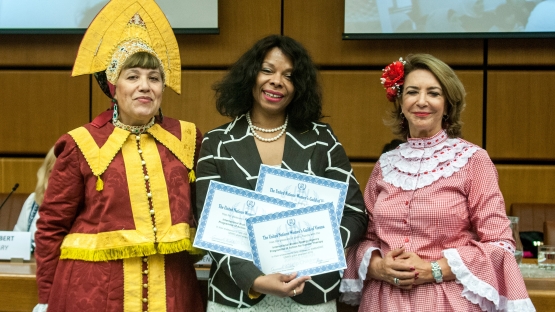“We are honoured to continue supporting worthy causes with PACT to help improve the level of care received by young cancer patients,” said Marina Radchenkova, President of the UNWG at the award ceremony held in Vienna, on 5 October 2016. “Over our 50 year history, the United Nations Women’s Guild has worked hard to improve the lives of vulnerable children around the world through projects like this,” she said.
As part of the IAEA’s Programme of Action for Cancer Therapy’s (PACT) support to countries to scale-up and improve much needed cancer services, the UNWG this year awarded grants to the Paediatric Clinic in Sarajevo, Bosnia and Herzegovina, the Oncology Unit of the National Paediatric Hospital in San Salvador, El Salvador, and the Parirenyatwa Group of Hospitals in Harare, Zimbabwe. The donations to these centres will bring long-term benefits to both the young cancer patients receiving treatment and their families.
It is estimated that 175,000 children are diagnosed with cancer globally each year, but over 80% (150,000) of these occur in the developing world.[1] The chances of surviving the disease in these countries can be as little as a third compared to around 90% in Western Europe.[2] Small investments in childhood cancer services can help to considerably extend children’s lives.
In 2015, UNWG awarded grants through PACT to support two projects tackling paediatric cancer in Ghana and Viet Nam. The gifts totalling €16,000 supported the centres in improving the delivery of services to the hundreds of patients they treat each year, while also making the units more comfortable for both the children and their families.
Upon accepting the donation on behalf of the three organisations, Nelly Enwerem-Bromson, the Director of IAEA’s Programme of Action for Cancer Therapy, underlined the importance of partners, like the UNWG, whose work and donations have a significant positive impact on society. ‘These awards are an investment in the future. By improving and expanding the crucial cancer services provided at these centres more children will benefit from better care and increase their chances of being cured from this terrible disease,” she said.
Programme of Action for Cancer Therapy (PACT)
PACT was established as part of the International Atomic Energy Agency (IAEA) to help fight the growing cancer crisis in the developing world. The IAEA has over 40 years experience in supporting countries in applying nuclear technologies for health and prosperity. PACT works to improve IAEA Member States’ capacities to address the growing cancer burden through promoting the integration of radiotherapy technologies within a comprehensive national cancer control programme. PACT builds strong strategic partnerships, particularly with the World Health Organization, to provide equitable, affordable and quality access to cancer care for all cancer patients to the highest standards, everywhere. cancer.iaea.org




